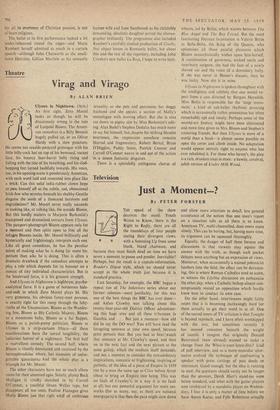Theatre
Virag and Virago
By ALAN BRIEN Ulysses in Nighttown. (Arts.) AT first sight, Zero Mostel looks as though he will be disastrously wrong in the role of Leopold Bloom. The Ameri- can comedian is a Billy Bennett hugely puffed up, or an Oliver Hardy with a slow puncture. He seems too seaside-postcard grotesque with his little billy-cock hat on top of his bemused, vacant face, his bouncy beer-barrel belly rising and falling with the tide of his breathing, and his clod- hopping feet turned bashfully inwards. His voice, too, in his opening scene is ponderously American, with each word laid and cemented into place like a brick. Can this solid india-rubber clown hope to pass himself off as the subtle, sad, obsessional Irish-Jew who secretes beneath his shabby-Gentile disguise the seeds of a thousand heroisms and degradations? Mr. Mostel never really succeeds in looking like, or talking like, the outside Bloom. But this hardly matters in Marjorie Barkentin's transposed and dramatised extracts from Ulysses. The passport-photograph Bloom appears only for a moment and then splits open to free all the refugee Blooms inside. Mr. Mostel brilliantly and hysterically and frighteningly interprets each one. Like all great comedians, he has the peculiar talent of making what he is doing far more im- portant than who he is doing. This is often a dramatic drawback if the comedian attempts to play a role which depends for its humour on a mosaic of tiny individual characteristics. But in the boulevard farce, it is his greatest strength.
And Ulysses in Nighttown is highbrow, psycho- analytical farce. It is a game of boisterous hide- and-seek in which Zero Mostel plays Id. His very grossness, his obvious funny-man persona, is exactly right for this romp through the laby- rinths of the Unconscious. Bloom as the Wander- ing Jew, Bloom as His Catholic Majesty, Bloom as a monstrous baby, Bloom as a fat flapper, Bloom as a parish-pump politician, Bloom as Ulysses' in a strip-cartoon Ithaca—all these manifestations have the unreal tangibility, the ludicrous horror of a nightmare. The first half is marvellous comedy. The second half, where Bloom is ritually dominated and castrated by the hermaphrodisiac whore, has moments of unfor- gettable queasiness.t And the whole play is a triumph for Mr. Mostel.
The other characters have not so much elbow room for their atomised egos. Stately, plump Buck Mulligan is vividly sketched in by Carroll O'Connor, a youthful Orson Welles type, but disappears all too soon. Pauline Flanagan gives Molly Bloom just that right whiff of ambitious gexuality as she pets and patronises her doggy husband and she speaks a section of Molly's monologue with moving effect. But she is also cut down to pigmy size by Miss Barkentin's edit- ing. Alan Badel's Stephen Dedalus has much more to say for himself, but, despite his striking Hamlet overtones, the impression somehow remains blurred and fragmentary. Robert Bernal, Brian O'Higgins, Paddy Stone, Patrick Connor and Carroll O'Connor weave in and out of the action in a dozen fantastic disguises.
There is a splendidly ambiguous chorus of whores, led by Belita, which wavers between The Blue Angel and The Boy Friend. But the most fascinating Joycean incarnation is Valerie Bettis as Bella-Bello, the King of the Queens, who epitomises all those painful pleasures which Bloom masochistically wishes upon him-herself. A combination of governess, wicked uncle and veterinary surgeon, she had the face of a newly shaved cat and the voice of a dormitory bully. If she was never in Bloom's dreams, then he was lucky. Now she is in mine.
Ulysses in Nighttown is spoken throughout with the intelligence and subtlety that one would ex- pect from a cast directed by Burgess Meredith. Miss Bettis is responsible for the 'stage move- ment,' a kind of sub-ballet rhythmic prancing which is occasionally rather pretentious but often remarkably apt and timely. Perhaps some of the second-act fantasy might have been eliminated and more time given to Mrs. Bloom and Stephen's roistering friends. But then Ulysses is more of a world than a book—it almost seems possible to open the cover and climb inside. No adaptation would appear entirely right to anyone who has ever inhabited it. For those who haven't, the play is a rich, drunken treat in store: a bawdy, cerebral, adult version of Under Milk Wood.














































 Previous page
Previous page